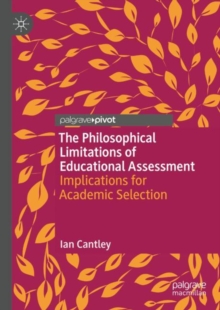 Ian Cantley‘s book, ‘The Philosophical Limitations of Educational Assessment: Implications for Academic Selection,’ is a well-researched and thought-provoking read. We often look at the facts and figures of selective education to comment on the problems for disadvantaged pupils, the unimpressive results, and even economic damage; but what about the ethics and moral questions of an 11-plus divide?
Ian Cantley‘s book, ‘The Philosophical Limitations of Educational Assessment: Implications for Academic Selection,’ is a well-researched and thought-provoking read. We often look at the facts and figures of selective education to comment on the problems for disadvantaged pupils, the unimpressive results, and even economic damage; but what about the ethics and moral questions of an 11-plus divide?
This book looks at the tensions associated with using the results of high stakes tests to predict students’ future potential. The author suggests that, ‘the practice of using the results of contemporary high stakes tests to make important decisions about students incurs logical and moral problems that a conscientious educator cannot ignore. The gravity of the moral transgression depends on the purpose and significance of the test and, in the case of high stakes tests used for academic selection purposes, I argue that not only can the moral wrong be highly significant, but better solutions are within reach.’
The author presents evidence from studies around the reliability of tests such as the 11-plus. How can it be right to make a high-stakes judgement with a one-off test of dubious reliability? He makes a strong case for the 11-plus being problematic due to the the possibility of students under-performing if they simply have a “bad day”.
The history of 11-plus tests and academic selection is also studied at depth. There are interesting thoughts on the way the Eugenics movement shaped testing, plus an excellent summary of the controversy surrounding Cyril Burt’s work and conviction that ‘innate ability’ could be tested and measured. Burt’s faked results are a scandal from long ago history, but let’s not forget that they led to a test that is still in use in 2024.
Another chapter looks at the consequences of academic selection. There is a summary of evidence into the effectiveness of grammars in Northern Ireland, England, and a look at selection internationally. There is also a look at equity and social mobility concerns.
The final chapter offers a thought-provoking look at the ethics of academic selection. Ian Cantley argues that the consequences of a flawed one-off test can lead to harmful treatment of some candidates. It is also an obvious ethical concern that academic selection will be bound to disadvantage poorer pupils, who rarely pass the test due to the attainment gap, as well as competition from pupils with expensive private tuition. The author says, ‘It seems reasonable to argue that those politicians who condone academic selection based on high stakes tests are guilty of perpetrating epistemic injustice… against some students from lower socioeconomic backgrounds.’
The book states, ‘I suggest that the practice of making decisions about students based on the results obtained in contemporary high stakes tests potentially incurs logical and moral problems that a conscientious educator cannot ignore. The gravity of the moral transgression depends on the purpose and significance of the test and, in the case of high stakes tests used for academic selection purposes, I have argued that, not only can the moral wrong be highly significant, but better solutions are within reach…. These matters are too important for educationalists to bury their heads in the sand, and to persist with flawed policies that could have deleterious consequences for the life chances of many children and young people.’
This book is an excellent guide to the history and ethical problems of dividing pupils with a flawed test at age 11 and is well worth a read. Much of the book can be read at the link below.
‘The Philosophical Limitations of Educational Assessment: Implications for Academic Selection’ by Ian Cantley, Palgrave Macmillan





